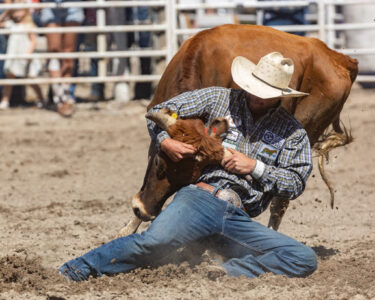Duitscher family milks it for all it’s worth
-
-Messenger photo by Kriss Nelson
Dean Duitscher, Dan Duitscher, Ashlyn Duitscher and Dave Duitscher show some of the products made with their milk. Dutchland Dairy milk is the only milk used at the Caves of Fairbault plant to make Blue Cheese.
-
-Messenger photo by Kriss Nelson
Dutchland Dairy milks 1,700 cows twice a day. Their herd is made up of a cross-breeding program consisting of Jerseys, Brown Swiss and Holstein cows.
- -Messenger photo by Kriss Nelson Dutchland Dairy was started in 1998 and is located near the town of Rolfe in Pocahontas County.

-Messenger photo by Kriss Nelson
Dean Duitscher, Dan Duitscher, Ashlyn Duitscher and Dave Duitscher show some of the products made with their milk. Dutchland Dairy milk is the only milk used at the Caves of Fairbault plant to make Blue Cheese.
ROLFE – In recent years milk prices paid to farmers have not been meeting their costs of production, ultimately shutting down thousands of dairy farms.
One particular dairy near Rolfe in Pocahontas County has managed to maintain steady growth despite some recent hard times.
Dutchland Dairy
Dutchland Dairy was started back in 1998. Starting up the operation has allowed for Dean Duitscher’s two sons, Dave Duitscher and Dan Duitscher to return to their family’s farm.
“I was practicing as a veterinarian in Wisconsin and wanted to get back closer to home,” said Dave Duitscher.

-Messenger photo by Kriss Nelson
Dutchland Dairy milks 1,700 cows twice a day. Their herd is made up of a cross-breeding program consisting of Jerseys, Brown Swiss and Holstein cows.
Dave Duitscher and his father Dean Duitscher and brother Dan Duitscher now own and operate the dairy along with 25 other employees.
Each of the Duitschers have their own specialties they bring to the operation
Dean Duitscher, a retired veterinarian, who will be 83 years old in August is at the dairy each morning tagging and caring for the new born calves and serves the dairy tending for animals as needed.
Dave Duitscher a DVM is in charge of caring for the overall herd health, breeding, embryo transfer and more.
Dan Duitscher, who had been managing a dairy plant for Prairie Farms in Kansas came into the family business a few years after it began, and handles a lot of the business end of the operation, schedules employees coordinates forage harvest and more.

-Messenger photo by Kriss Nelson Dutchland Dairy was started in 1998 and is located near the town of Rolfe in Pocahontas County.
Since its inception 23 years ago, the Duitschers said they have steadily grown. What started out as a 350-cow dairy has now developed into a 1,700-cow operation.
Those 1,700 cows are milked twice day with the average cow, Dave Duitscher said giving nine to 10 gallons daily.
“In a day, we basically get two-and-a-half semi loads of milk, which is 15,000 gallons of milk a day,” he said.
The milk goes directly from the cow to the chiller and in just under two minutes the milk is chilled to 35 degrees.
Chilling the milk, Dave Duitscher said is a main factor as to why they are able to produce a quality product.
Dutchland Dairy is a member of Prairie Farms Co-op. Once the milk is chilled it goes directly into a tanker to be delivered to a Prairie Farms plant.
Consumers can enjoy Dutchland Dairy milk through a variety of brands including Prairie Farms and Hiland Dairy as well as other private label fluid products; Shullsburg Cheese brand and Caves of Fairbault only uses Dutchland Dairy milk for their blue cheeses.
“We produce a high quality milk, with a lot of fat and a lot of protein. It makes really good cheese and gives them a consistent product,” said Dave Duitscher adding that particular plant takes about 10 loads of milk per week.
The rest of the milk, which comes from a cross breeding program involving Jerseys, Brown Swiss and Holsteins, is trucked to a cheese plant in Luana or to Prairie Farms Co-op plants in Sioux Falls, South Dakota or Dubuque.
The fact there are no local milk plants near Dutchland Dairy could be considered a curse as well as a blessing.
“It is a little more expensive for us to get the milk to a plant, that is a drawback to this area. If there were more milk plants in this area, there would be more dairies, but we don’t have the pressure to compete with other dairies around,” said Dave Duitscher.
Misconceptions
There are oftentimes misconceptions that surround just about every aspect of the livestock industry – whether that be environmental or animal care fallacies.
With Dean Duitscher and Dave Duitscher both DVM’s, animal care is a passion of theirs. There are many facets to caring for their cows, but one area involves employee training and an incentive program.
“Throughout the year, we do different trainings with the employees including safety and a lot of it is also proper treatment of the cow,” said Dan Duitscher. “The better we treat that cow, the better she is going to treat us, so the better we can treat the employees. If the dairy does better, the employees do better. They take ownership in it.”
“It is really important to us to take care of the cows because if we don’t, they don’t make milk or their milk quality is affected,” said Dave Duitscher. “We try to do a lot of things to make sure our animals are healthy. The healthier we have our cows, the healthier our business is.”
To help care for the environment, Dutchland Dairy follows an Iowa DNR approved manure management plan and recycling program of the sand they use for bedding.
The Duitschers enjoy giving tours of their state-of-the-art dairy when schedules allow.
Dean Duitscher said it is oftentimes a trip down memory lane for older farmers that can remember their family’s dairy operation and it also brings understanding of dairy production to those that may believe milk comes directly from a grocery store or that chocolate milk comes from brown cows.
June is National Dairy Month
This June, celebrate National Dairy Month with your favorite dairy treat. Originally established as a grocery/milk promotion in 1937, National Dairy Month now acts as a reminder of the health benefits that dairy products provide. They contain essential nutrients — including calcium, potassium, vitamin D, and protein. They also reduce the risk of high blood pressure, osteoporosis, and certain cancers, while helping us to better manage our weight. Kick start each day with nutrient-rich dairy products and start your summer on a healthy note.
Homemade chocolate milk, peanut butter, banana fudgesicles
Makes 6 Servings
Prep Time: 10
Ingredients
1 1/2 cups low-fat chocolate milk (or fat level of choice)
2 ripe bananas
3 tablespoons peanut butter, chocolate peanut butter or chocolate hazelnut spread. For the richest chocolate flavor, use chocolate peanut butter or chocolate hazelnut spread.
1/4 teaspoon ground cinnamon
Combine all ingredients in a blender and puree until smooth.
Pour mixture into popsicle molds and freeze for at least 6 hours or overnight.
Three-cheese fondue
Makes 6 Servings
Total Time: 15-20
If you’re looking to impress your sweetie with a cozy evening in–or if you’re looking for an apres ski to impress friends–look no further than this fondue recipe. This melty mountain of flavorful cheese is perfect for dipping veggies, bread and more. Introduced in midcentury Switzerland, the dish evokes chalets, warm fires and relaxing evenings.
Ingredients
2,14.5-ounce cans cannellini beans, drained and rinsed
1 clove garlic, peeled
1 teaspoon lemon juice
2 teaspoon Dijon mustard
1 cup Sauvignon blanc or other dry white wine, divided
8 ounces Swiss cheese, shredded
4 ounces aged Gouda cheese, shredded
4 ounces Parmesan cheese, grated
In a blender, combine cannellini beans, garlic, lemon juice, Dijon mustard and a 1/2 cup of white wine. Puree the mixture until smooth.
Transfer the bean puree to a heavy bottom pot and place over medium heat on the stovetop. Bring the mixture to simmer and cook, stirring frequently, for 10 minutes.
Add the remaining 1/2 cup of wine and stir to incorporate. Begin adding the cheeses, 1 handful at a time, stirring constantly until the cheeses are melted and fully incorporated. If making the fondue ahead, transfer the cheese mixture to an airtight container and store in the refrigerator for up to 24 hours. Before serving, reheat cheese over low heat, stirring until fully melted.
To serve, transfer the mixture to a fondue pot set over a heating element. Warm, stirring frequently to ensure even heating. No fondue pot? Simply transfer the melted cheese mixture to a crock pot or slow cooker and set it to the lowest setting. Serve with a variety of garnishes. Now you know how to make cheese fondue!
Dippers for your cheese fondue: Rustic artisan bread cubes, new potatoes (boiled and cooled), blanched or roasted broccoli and cauliflower florets, baby carrot sticks, radishes, apple slices, etc. all go with this easy cheese fondue recipe.
Recipes courtesy of US Dairy.com
Facts about Iowa’s dairy industry
Economic
• 15,587 jobs for Iowans including direct, indirect, and induced analysis
• Labor income for all dairy farming and dairy manufacturing $891,256,190
• $1,724,289,766 in value added impact by Iowa’s Dairy Industry
• Total Output for Iowa’s Dairy Industry is $5,557,979,243
• For every 14 cows, one fulltime job is created through the entire dairy and processing sectors
Iowa Dairy Farms
• 883 Iowa Dairy Farms
• Iowa milk cows total 223,000
• Iowa’s dairy industry is the 5th largest agriculture sector in the state
• Iowa ranks 12th in the nation in total milk production
• Iowa’s milk production represents 2.45 percent of the total U.S. milk production.
Sustainability
Thanks to modern and innovative dairy farming practices, producing a gallon of milk in 2017 required:
• 30% less water and 21% less land and had a 19% smaller carbon footprint than 2007.
Information courtesy of the Iowa State Dairy Association






